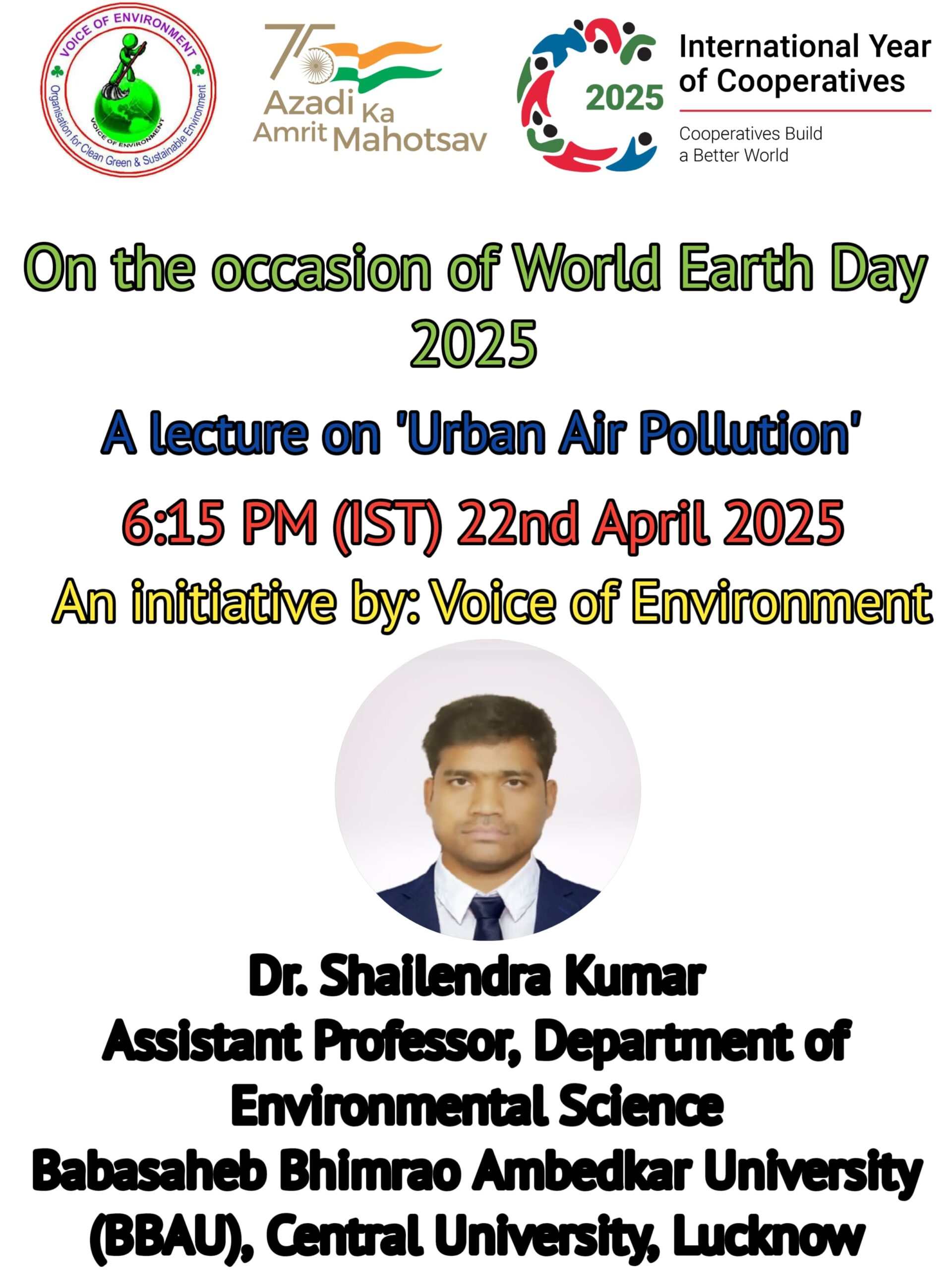On the occasion of World Earth Day, Voice of Environment (a scientific and Environmental Research Organization) organized a lecture session on the broad theme of “Urban Air Pollution”.” Saurav Narayan, a research scholar at the Central University of Punjab, Bathinda, gave a welcome address.
Dr. Shailender Kumar, an Assistant Professor in the Department of Environmental Science at Babasaheb Bhimrao Ambedkar University (BBAU), a central university in Lucknow, Uttar Pradesh, India, delivered the keynote lecture.
Dr. Kumar delivered an insightful presentation titled “Urban Air Pollution”, focusing on the increasing burden of air pollution in urban environments and its far-reaching effects on public health, ecosystems, and climate.
The lecture began with an explanation of urban microenvironments, highlighting how human interactions with the built environment—through transport, housing, and industrialization—affect air quality. Dr Kumar emphasized that microenvironments, characterized by homogenous concentrations of pollutants, are essential components in exposure assessment and modelling.
He elaborated on the major types and sources of air pollution, including particulate matter (PM2.5 and PM10), carbon monoxide, sulfur dioxide, nitrogen oxides, ozone, and lead. According to his data, vehicular emissions, industrial activities, biomass burning, and road dust are among the dominant contributors to urban air pollution in India.
Dr Kumar presented national-level statistics, including a disturbing trend of rising PM2.5 concentrations in Indian cities over the past two decades. He also shared forecasted data on particulate matter and discussed the implications of these trends for urban health and policy.
The lecture then explored the health impacts of air pollution, especially focusing on vulnerable groups such as children, the elderly, pregnant women, and those with pre-existing health conditions. Dr Kumar cited World Health Organization statistics and Indian studies, noting that air pollution is linked to respiratory diseases, cardiovascular issues, premature births, cognitive impairments, and millions of premature deaths annually. He also addressed the economic and environmental toll, including reduced crop yields due to ozone damage, hindered solar energy generation from particulate haze, and weakened monsoon patterns due to aerosols. In the concluding segment, Dr. Kumar outlined solutions and public health strategies, including:
Monitoring air quality with advanced tools. Shifting to cleaner fuels.
Promoting public transport and non-motorized travel.
Urban planning for green spaces.
Educating communities on air pollution mitigation.
He encouraged the use of tools like the AQI app for real-time air quality monitoring and highlighted the importance of public awareness and individual responsibility in combating air pollution. The session concluded with a Q&A round, where attendees actively participated, raising concerns and seeking guidance on local air quality issues. Dr. Kumar’s session was highly informative and well-received by students, researchers, environmentalists, and policy advocates.
Rakesh Choudhary from the Department of Civil Engineering, National Institute of Technology Delhi, New Delhi, and Environmentalist Moharana Choudhury from the Environmental Research and Management Division, Voice of Environment(VoE) Guwahati, Assam, India, jointly moderated the Q&A session.
Many participants around the country have raised questions during Q&A sessions. Professor Kamal Kant Joshi from the Department of Environmental Sciences, Graphic Era Hill University, Dehradun, Uttarakhand, India, who has raised question on indoor air pollution and indoor gym related. Among them is Professor Researcher Gaurav has asked about the term “criteria pollutant” in the context of air pollution. Another participant, Kartik, raised a concern about the rising exposure to heat waves in North India and asked if there is any short-term roadmap to curb this issue, considering that tree plantation will require more time. Dr Sandhya Sharma from the Department of Biochemistry, Institute of Dental Studies and Technologies Modinagar, Uttar Pradesh, said the session was very insightful and informative.
Prernaa Sharma, a research scholar has also asked question on air pollution research related aspects.
The session ended with a Vote of thanks offered by Researcher and Environmentalist Moharana Choudhury from the Voice of Environment team.
This lecture significantly contributed to the capacity building of air pollution awareness and demonstrated the role of informed scientific engagement on environmental issues.

